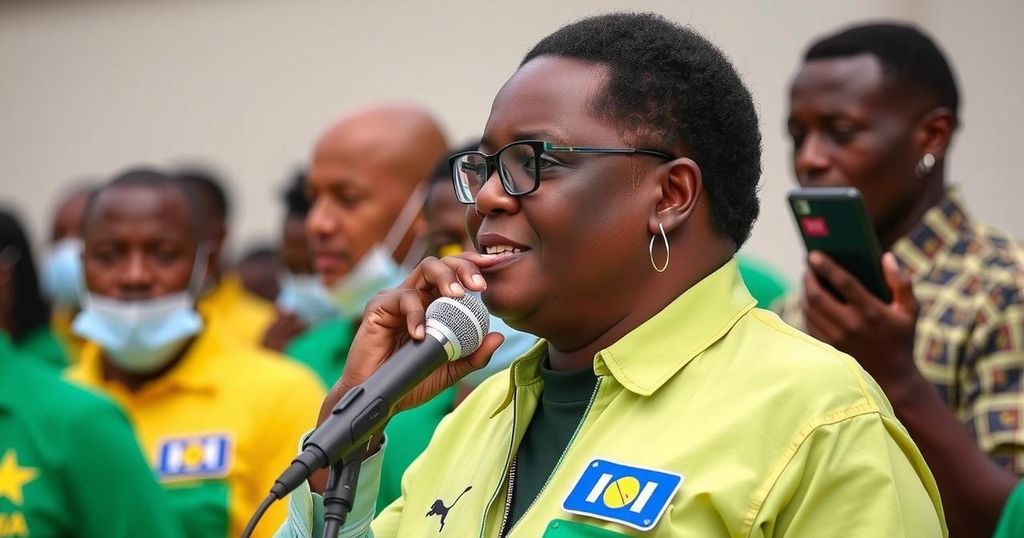World news
2024 ELECTIONS, AFRICA, ALI BONGO ONDIMBA, BILLBOARD, BR, BRICE OLIGUI NGUEMA, COMMITTEE FOR THE TRANSITION AND RESTORATION OF INSTITUTIONS, CORRUPTION, CT, ELECTIONS, GABON, INTERIOR MINISTRY, LIBREVILLE, NATIONAL ASSEMBLY, OLIGUI, POLITICS, UNION NEWSPAPER, VOTER TURNOUT
Fatima Alavi
0 Comments
Gabonese Voters Show Strong Support for New Constitution in Referendum
Gabon’s military rulers announced strong approval for a new constitution in a recent referendum, with provisional results indicating 91.8% support from voters. The constitution proposes term limits for the presidency, mandates candidates to be exclusively Gabonese, and has drawn both support and criticism, with opponents arguing it may pave the way for dictatorship. The interior ministry reported a voter turnout of 53.54%, with final results to be confirmed by the constitutional court.
Gabon’s military leadership has reported that a newly proposed constitution has received overwhelming support in a recent referendum, as indicated by provisional results released on Sunday, heralding a significant transition for the oil-rich nation. The approximately 860,000 registered voters were encouraged through various media channels to actively participate in the voting process, choosing either a green ballot for “yes” or a red ballot for “no.” The constitution proposes a presidency limited to a maximum of two seven-year terms, eradicates the position of a prime minister, and prohibits dynastic succession. According to the results announced by the Committee for the Transition and Restoration of Institutions (CTRI), 91.8 percent of voters endorsed the new constitution, although turnout was reported at 53.54 percent, lower than the previously anticipated figure of 71 percent.
The constitution also stipulates that presidential candidates must be Gabonese citizens, with at least one Gabonese parent and a Gabonese spouse; this regulation effectively disqualifies former president Ali Bongo Ondimba and his progeny, as he is married to a French woman. Transitional President Brice Oligui Nguema characterized the referendum as a “great step forward,” emphasizing the transparent nature of the voting process. Notably, he has expressed intentions to transition power back to civilians after a two-year period but has aspirations to secure the presidency in the slated election for August 2025.
Concerns regarding the legitimacy of the referendum prevailed, particularly due to the junta’s propaganda campaign that accompanied the process. Detractors criticized the proposed constitution for potentially enabling a dictatorial regime, with lawyer Marlene Fabienne Essola Efountame claiming, “We are creating a dictator who designs the constitution for himself.” This sentiment reflects broader apprehensions regarding governance and accountability within Gabon.
The interior ministry claimed to have undertaken all necessary measures to ensure a transparent electoral process, though the presence of international observers was noted to be absent, contrasting with past elections. Following the voting, an Afrobarometer survey revealed that nearly 87 percent of participants believed the nation was progressing positively. Nonetheless, prevailing issues such as unemployment and high living costs remain critical concerns among the populace. The final confirmation of the referendum results is anticipated from the constitutional court.
Gabon has undergone significant political changes following a military coup in August 2023, which resulted in the ousting of Ali Bongo Ondimba after a contested presidential election. The junta established a transitional government, with promises to return power to civilians. The proposed constitution reflects these changes by introducing limitations on presidential terms and changing eligibility requirements for candidates. The political climate is characterized by a strong emphasis on national sovereignty and addressing widespread discontent regarding governance, unemployment, and social issues, making the referendum a pivotal moment in Gabon’s political evolution.
The recent referendum in Gabon indicates a populace largely in favor of significant constitutional changes proposed by the military authorities, amidst allegations of autocratic governance and propaganda. While the transition might signal a shift towards a more structured political framework, critical voices question the implications for democratic integrity and the potential emergence of a dictatorial regime. The awareness of public concerns regarding the economy and governance will likely shape the trajectory of the transitional government as it prepares for future elections.
Original Source: www.tiogapublishing.com




Post Comment